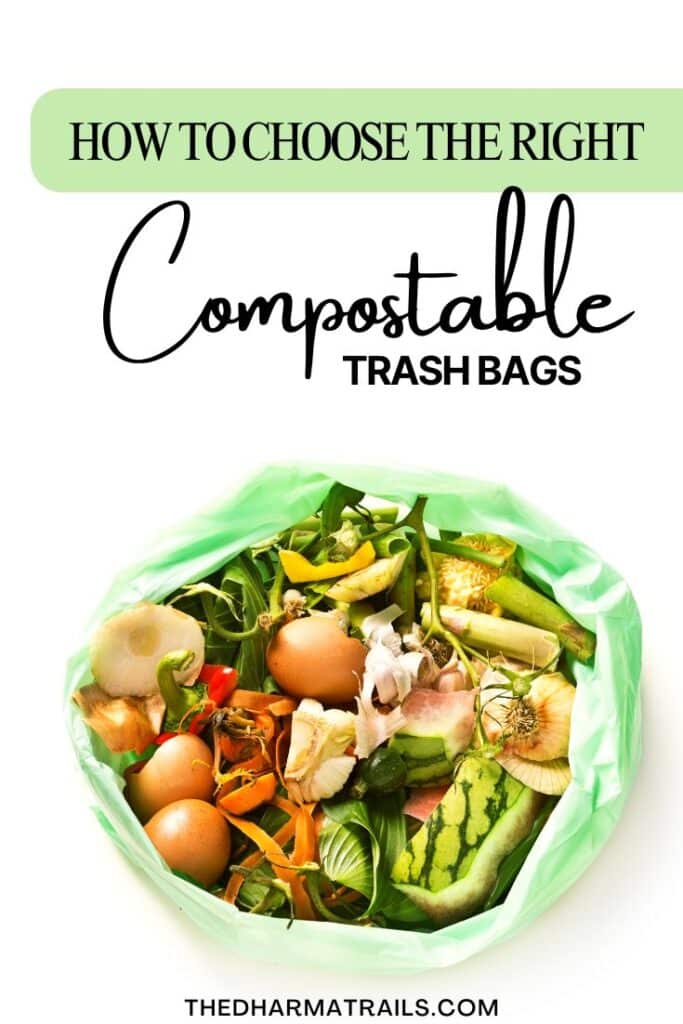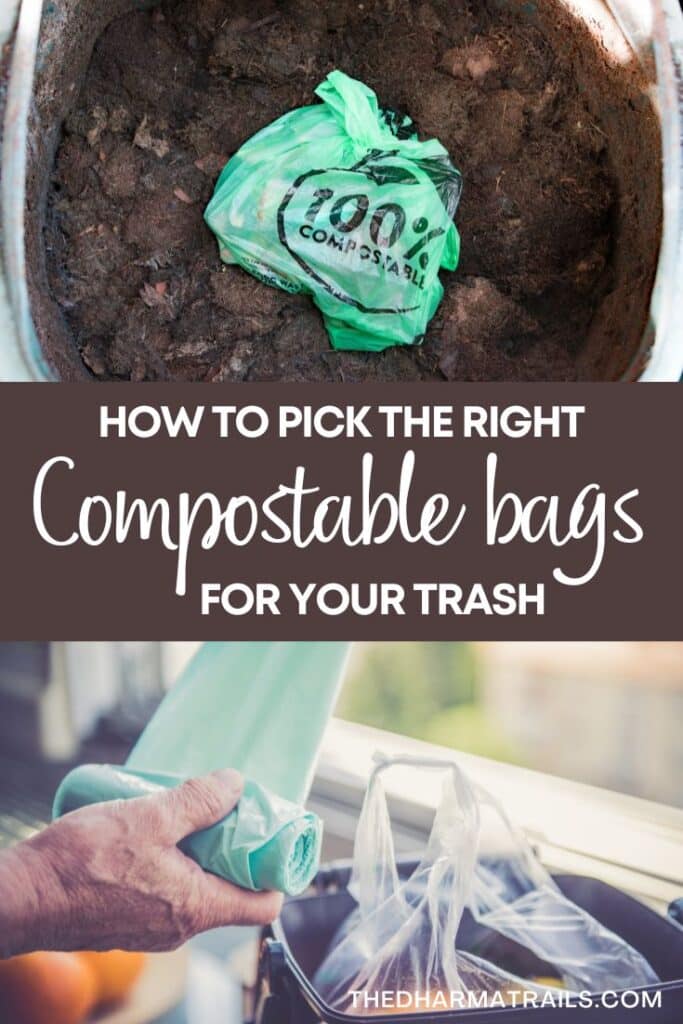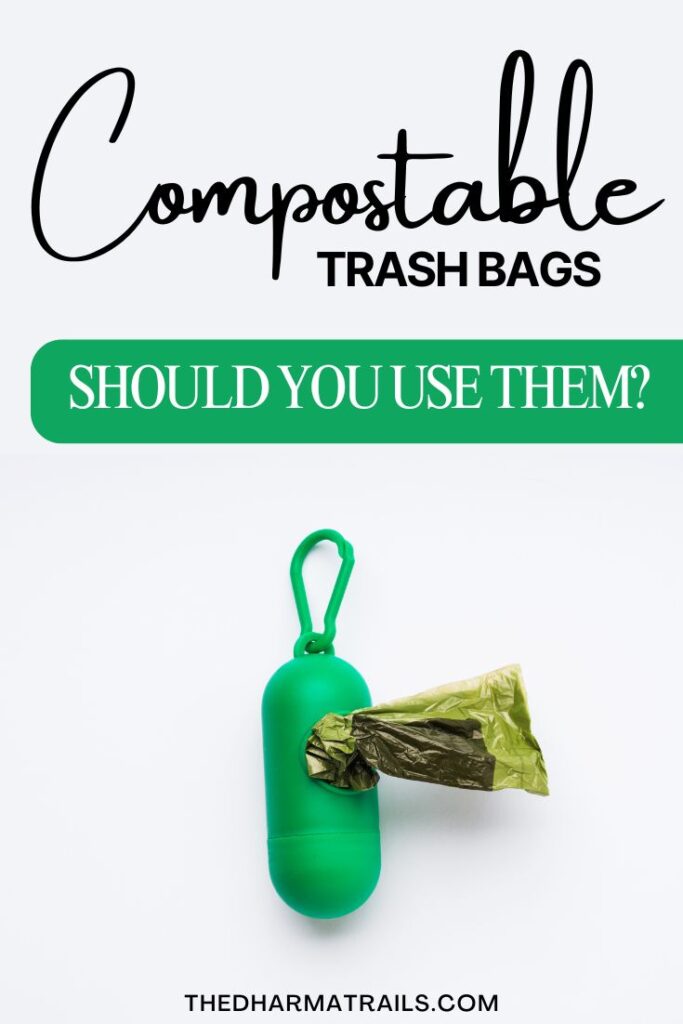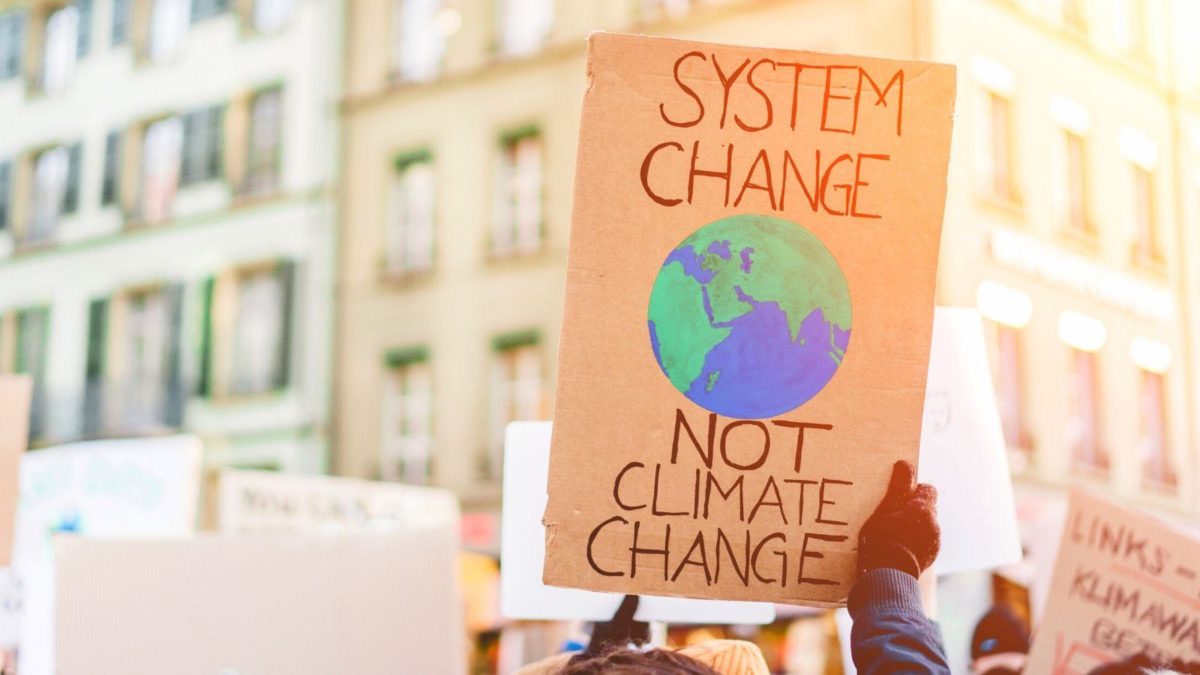Are you thinking of making the switch to Compostable Trash Bags? Whether you are looking for a more sustainable option to pick up your pets business, or looking for a bag to use with your compost bin, we delve into what exactly what it means to be a “compostable” trash bag, when you should use them, what to look for, and where to find them.
This post may contain affiliate links, which means I may earn a commission if you click a link and make a purchase. As an Amazon Associate, I earn from qualifying purchases.
Compostable Trash Bags Summary
| Overall conclusion | Compostable trash bags don’t decompose properly in landfills due to the lack of sunlight and oxygen. However, they are ideal for holding compostable waste. If you do any home composting, or send your compost to a community initiative, make sure you use bags that are certified for home composting. If they aren’t certified for ‘home’ composting, then they require specific conditions to break down and can only be processed in certain industrial facilities. |
| Practical considerations | Home compostable bags are more prone to damage, so avoid putting liquids and sharp objects in them. If you have home composting, use a reusable container instead of bags for organic waste. |
| Product Recommendations | UNNI Compostable Trash Bags: Home compost certified, 0.85mm thick, 100 pack, standard trash bin size. Airnex Compostable Trash Bags: Home compost certified, made from cornstarch, 50 pack, small size for countertop compost bin. |
| How to compost | If you’ve got space, you can create a compost ‘pile’ or use a compost bin or tumbler. If you have less space, consider sending your compost to a community composting facility/group, or using an electric composter. For small amounts of compost, you can create a compost smoothie to feed to your outdoor plants. |
| Sustainability Steps | Use home compostable bags as a starting point, focus on reducing bag usage and reducing waste, and explore other eco-friendly kitchen practices for a more sustainable lifestyle. |
Table of Contents
Are compostable trash bags better for the environment?
To answer this question, you need a benchmark. Better than what?
Better than the standard plastic bag that doesn’t breakdown in a landfill, gets ripped during the trash piling and shifting process, blows into the environment, takes hundreds of years to breakdown and damages species and habitat in the process?
The bar is set pretty low.
There needs to be something better? Can simply swapping to a “compostable trash bag” be the answer we are looking for?
What are compostable trash bags made of?
There are a a few different brands making slight variations, however, the general ingredients look something like this:
- Plant starches (corn, potato, rice, sugarcane)
- Plant oils
- Compostable polymers
A polymer is a molecule made up of a lot of smaller molecules. They’re often used in mass production as a “filler” or to enhance the properties of another product.
Some examples of natural polymers include; silk, rubber, cellulose, wool, amber, keratin, collagen, starch, DNA.
A “Compostable polymer” is one that can degrade to result in Carbon Dioxide (CO2), water, inorganic compounds, and biomass at a rate consistent with other known compostable materials and leaves no visible, distinguishable, or toxic residue.
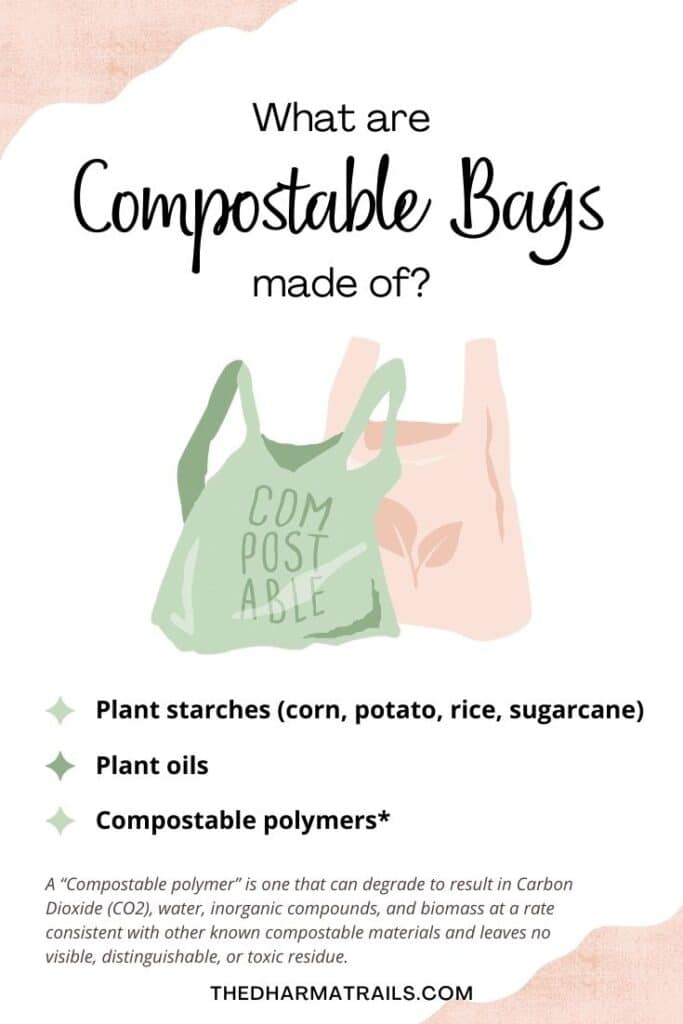
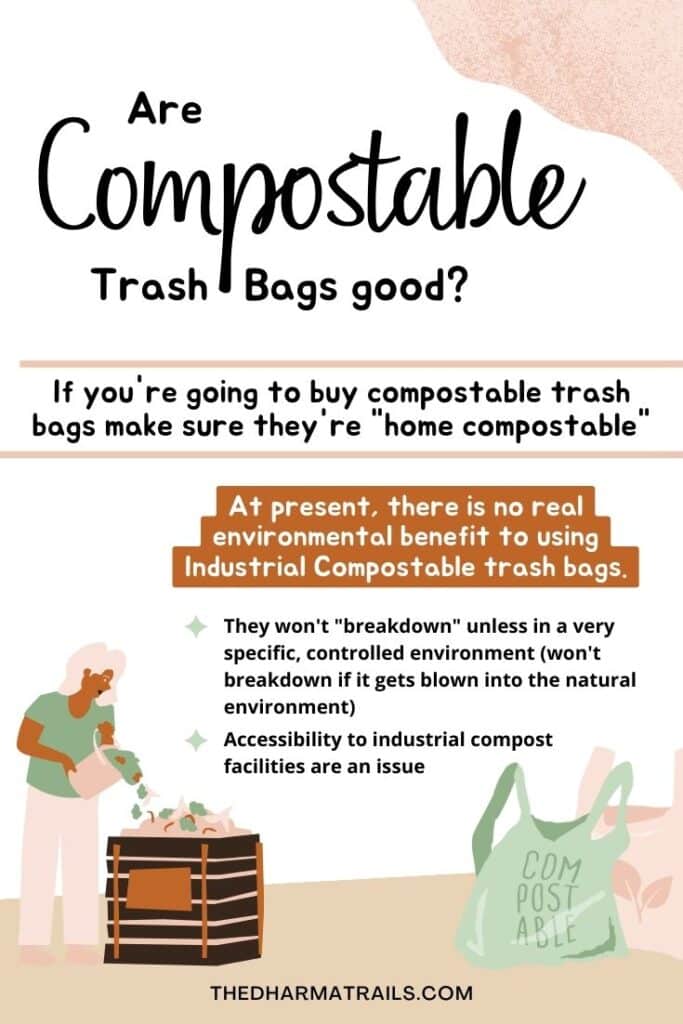
Are compostable trash bags biodegradable?
The problem with the term biodegradable is that everything can biodegrade over enough time.
This is why some places like California are putting strict laws in place to ban the use of the term “biodegradable” in product marketing.
So, in short, yes. Comparable trash bags are biodegradable. The idea behind labeling something biodegrading is to show that it breaks down in a relatively short time.
In principle, it should break sown at the same rate as organic material.
How long does it take for a plastic bag to decompose in a landfill
Plastic bags (and anything) never really break down in landfills due to the blocked access to oxygen.
In order for an object of any make to breakdown, it requires micro-organisms that require oxygen. That’s why landfills are not breaking down like compost heaps over time. Landfills continually build up until they are covered and another site then gets used.
Do compostable trash bags breakdown if they blow into the environment?
A 2019 study compared the breakdown impacts of three different kinds of bags:
- Conventional plastic bags
- Compostable Trash Bags
- Biodegradable Trash Bags
- Oxo-biodegradableTrash Bags
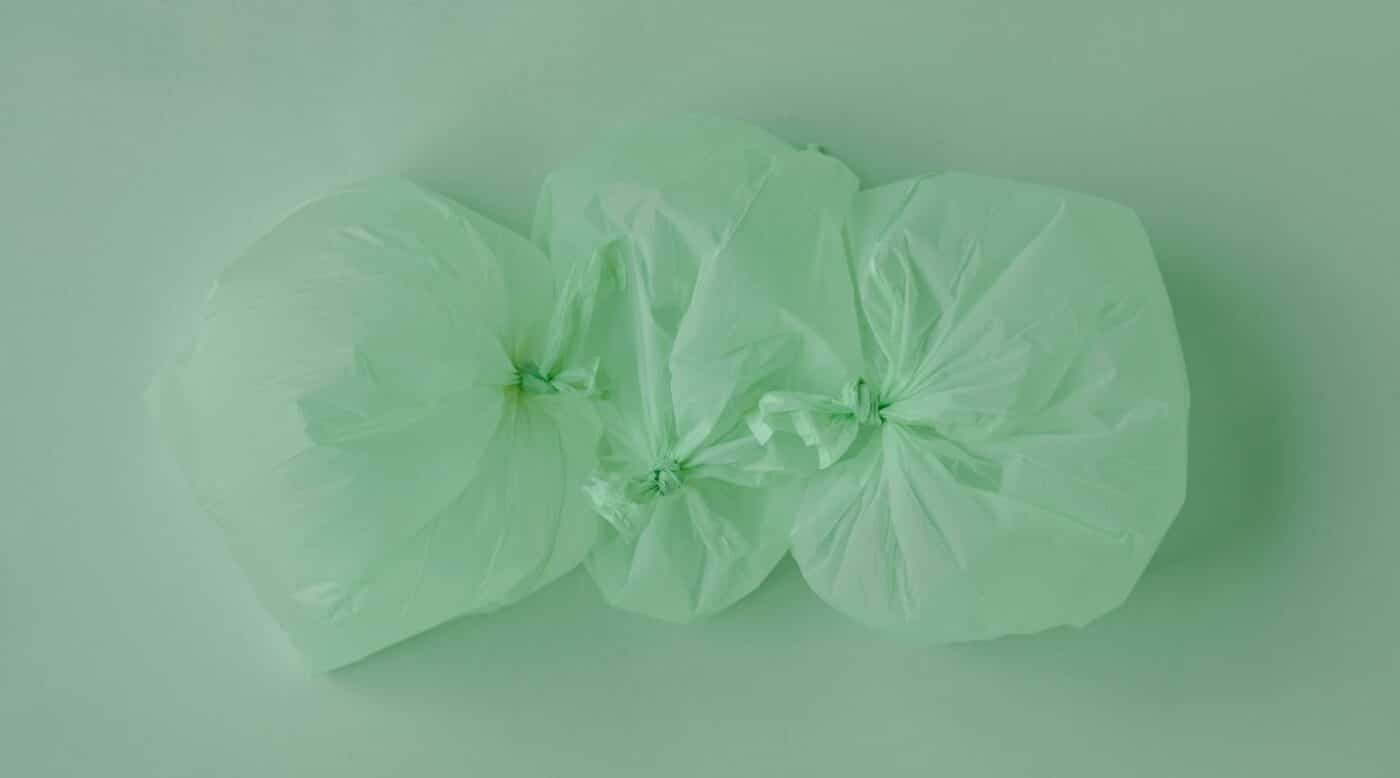
Compostable Bag Results
The test concluded the following:
- 3 months to break down in ocean conditions
- still intact after 27 months buried in the soil
- 9 months to break down in open air conditions
After spending three years in two different test conditions (water and soil), the biodegradable, oxo-biodegradable, and conventional plastic bags largely kept their original forms.
What happens if a compostable trash bag blows into the environment
If you dropped a compostable bag on the ground, or if it blew out of the landfill and landed in the environment (on land) it would likely breakdown in around 9 months (weather conditions depending).
That still leaves a lot of time for things to go wrong. There have been cases of deer in the wilderness ingesting plastic bags from landfills overflow.
Environmental Impact Manufacturing vs. Use
There is limited information on the real environmental impacts of manufacturing. Whether this is by design or not is up for debate.
Do compostable trash bags have a lower ecological footprint in manufacturing than traditional plastic?
Here is information on the manufacturing process comparing traditional plastic bags, compostable, and paper bags.
Manufacturing Process
The resources that are available include the following study by Boustead Consulting & Associates Ltd. conducted comparing the amount of energy required to produce different bag types.
Compared to traditional plastic grocery/trash bags (LDPE)
- Compostable plastic bags require 2.7 more energy
- Paper Bags require 3.4 times more energy
“Traditional plastic grocery bags use less energy in terms of fuels for manufacturing, less oil, and less potable water, and emit fewer global warming gases, less acid rain emissions, and less solid wastes.”
It is important to note that the study was prepared for (paid for) by the American Recyclable Plastic Bag Alliance
This group (formerly the American Progressive Bag Alliance [APBA]), is a political lobby group that represents the U.S. plastic bag manufacturing and recycling industry. Founded in 2005, it lobbies against U.S. local and state plastic bag bans and taxes.
There are quotes in the report like the following:
Some say, [plastic] has contributed to environmental conditions ranging from increased pollution to overloaded landfills to the country’s dependence on oil.
Boustead Consulting & Associates Ltd. – Prepare for the American Progressive Bag Alliance.
It is hard to take this report seriously when the author states something like the above in the introduction. Is there a bias towards the plastic bag in the results? Who is to know. But if the study was paid for those lobbying to keep the plastic bag in circulation, then it’s not out of the question.
How do compostable trash bags work?
When compostable “plastic” or compostable polymers came to market in the 1980’s they were a blend of a “conventional/synthetic polymer, usually polyolefin (e.g., polyethylene) mixed with starch or other organic substances. When starch was eaten by microorganisms, the products were broken down, leaving small fragments of polyolefins.”
Compostable Polymer Blending
To achieve the right material properties at low costs, compostable polymers are blended into natural polymers (starch from potatoes, cane, etc.).
These blends can come from either renewable or non renewable sources.
Renewable Blends
These are the ones made from renewable resources (ones to look for when choosing your computable trash bag)
- Polylactide (PLA)
- Polyhydroxyalkanoates: poly(3-hydroxybutyrate) (PHB)
- Thermoplastic starch (TPS)
- Cellulose
- Chitosan
- Proteins
Non-Renewable Blends
While these are still classed as “compostable”, they are made from non-renewable resources (petrochemical sources)
- Aromatic copolyesters (e.g., polybutylene adipate, PBAT)
- Poly ε-caprolactone – PCL
- Polyesteramides – PEA
- Polyvinyl alcohol – PVA
Two classifications of compostable (Industrial and Home) disposal
Compostable Trash Bags can be called “compostable” but have very different definitions of the term.
There are two different classifications, home compostable and industrially compostable.
Industrial Compostable
Many people are unaware that there are industrial composting facilities around the world.
These facilities attempt to standardize the composting process by using controlled measures. Some of these include:
- Keeping the composting material between 50°C and 60°C (122°F and 140°F).
- Ambient temperature microorganisms (that breakdown the compost) die out and are replaced by microbes adapted to live at high temperature (thermophiles)
- Some facilities have pre-screening/sorting equipment to remove contaminants. Since compostable plastics do not physically behave very differently from the traditional non- compostable plastics, the screening systems can exclude the compostable plastics from the composting process
Industrial Compost Trash Bags Summary
In summary, while compostable trash bags might state that they are “compostable”:
- You need to get your compostable bag to an industrial composting facility, of which there are not many readily available
- Your compostable trash bag may be screened and not make it into the facility
- Everything in the compostable trash bag also needs to be compostable
Industrial composting can be defined as:
Controlled biological decomposition of organic waste under managed conditions that are predominantly aerobic (i.e. in the presence of oxygen) and at high temperatures.
EuropeanBioplastics.org
Where to find an industrial compost facility?
To give you an idea of how difficult they are to find, you can check this industrial compost finder website. It focuses on the USA.
Note that many locations do not accept compostable bags either.
Industrial Composting Standards to Look For
These standards and logos related to the respective industrial standards of the country (area).


Home Composting
Home composting is a totally different idea to industrial composting.
As the name suggests, home composting your compostable trash bags means that you can put the bags directly into your compost bin at home, or a friends compost, or a community compost (assuming all the material inside the bag is also compostable).
Note that some council compost collection schemes – like Wellington’s– have stopped accepting compostable packaging, because it prevents the resulting compost from being certified as organic.
Home Compostable Logos to look for
There are only a small number (so far) of home compostable test faculties and standards worldwide:
- The German certifier DIN CERTCO offers a certification program for its “DIN Geprüft home compostable” certificate.
- TÜV AUSTRIA (formerly Vinçotte) is a certification body authorized by European Bioplastics
- This certificate is based on the Australian standard for home compostable plastics, AS 5810.
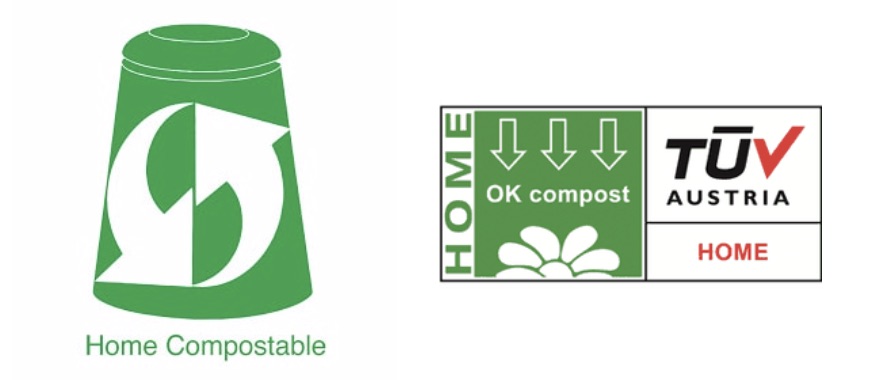
The AS 5810 seems to be the main standard for the concept of home composting. Their definition of home composting is:
Home Composting – The product of privately or home-generated organic waste, such as food, garden, and paper product waste, which has been subjected to composting, and which product is applied to private property soils without any commercial transaction.
AS 5810
BPI in the USA ASTM D6400 is not home compostable
It should be noted that for the USA The ASTM D6400 method is not meant to represent composting conditions in a home compost facility, as the composting temperature requirements are not likely to be achieved in a home facility over an extended period of time.
What does it mean to pass the home composting standard
Here are the summary points of what is required in order to pass the test and receive a logo or approval:
- After 180 days (6 months) 90% of the material should be in pieces smaller than 2mm (0.078 inches)
- The physical and chemical parameters of the compost will not be negatively affected by the plastic
- pH, salt content, nitrogen, ammonium nitrogen, phosphorus, magnesium, and potassium levels
- The germination rate and the plant biomass of plants in the home compost soil should be at least 90% the same with or without the plastic addition
- No more than 10% of soil worms can be negatively impacted
Would you want to eat produce grown using a home compostable plastic?
There are limited resources at the moment regarding this subject. However, New Zealand may be at the forefront of this investigation.
Research institute, Scion are investigating the effects of different compostable trash bag types on soils and plants that grow in them.
Initial discussions with Scion’s chief innovation and science officer, Elspeth MacRae state the following:
“[Micorplastics] can’t actually pass into the roots (of your vegetables) as micro-plastic particles, the only thing that could pass into the roots is some toxins. But if [your vegetables] are growing really well, it’s unlikely,” says MacRae
Scion’s chief innovation and science officer
Can compostable trash bags be recycled?
The short answer is, no.
Compostable trash bags are made up of a mixture of polymers and products different to those of traditional plastic bags.
If a compostable trash bag was to enter a recycling centre (and not be picked-up by the screening process) it would contaminate the plastic that actually can be recycled.
Are compostable trash bags good?
After going through all of the available data on compostable trash bags and seeing their true environmental impact, are they a good choice?
This is assuming that we are comparing the compostable bag to the traditional plastic bag.
If you’re going to buy compostable trash bags make sure they’re “home compostable”
At present, there is no real environmental benefit to using Industrial Compostable trash bags.
- They won’t “breakdown” unless in a very specific, controlled environment (won’t breakdown if it gets blown into the natural environment)
- It’s possible that pre-screening at an industrial compost facility might stop your bag from going inside and being processed
- Accessibility to industrial compost facilities are an issue
The irony of using home compostable trash bags
If you have a compost bin at home (or even accessible close to your home), there’s no need to put compostable scraps in a bag.
When you’re preparing a meal and separate your organic waste while doing so, you can simply walk the waste straight to your compost and tip it in.
If you have a community compost nearby, check to see if they are trying to be “organic”. As home compostable trash bags will not likely be accepted. In this instance, you can also use a reusable container to transport your organic waste to the site.
You should be aware too that it is not quite as simple as an “easy swap”. Home computable trash bags (due to their compostable nature) are more susceptible to damage than traditional plastic. Therefore, you should avoid putting liquids into the trash, and be careful with sharp objects.
>> Click here for Plastic Bag Alternatives for your Kitchen. This explains the easy steps to take towards a Zero Waste Kitchen
If you live in a small space and want to do a quick home compost, you can also try a Compost Smoothie!
Are compostable trash bags the easy “eco” option?
The way in which Home Compostable Trash Bags become a better option is for an easy green swap.
There is an “eco scale”. It’s a measure of how willing we are to make changes in order to achieve eco-living.
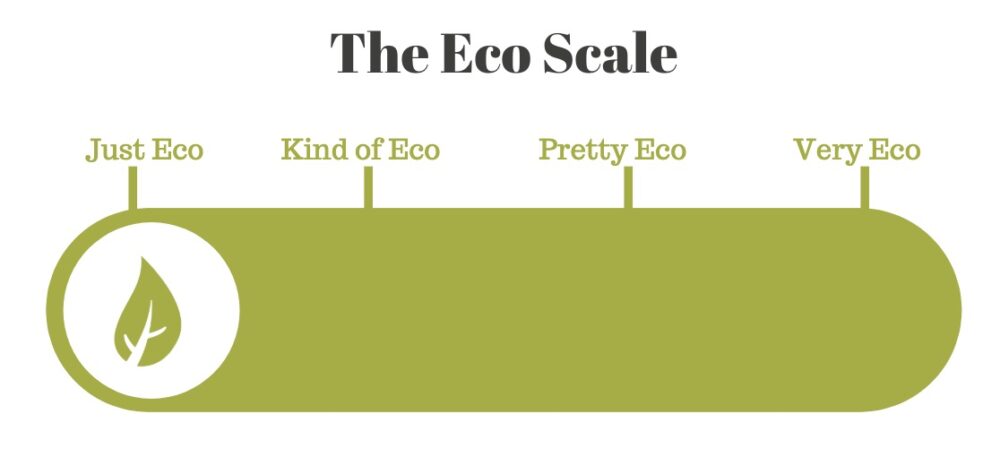
When it comes to trash for example the eco scale might look like this:
- Just Eco- everything remains the same in your life except you swap traditional trash bags for home compostable ones
- Kind of Eco – Purchasing less packaged foods (making more food items at home), reducing your organic food waste, using home compostable trash bags
- Pretty Eco – Purchasing less packaged foods (making more food items at home), reducing your organic food waste, using a home compost, having a trash bag free bin for other waste
- Very Eco – Producing your own, organic, vegan food. Using food scraps to compost and continue growing.
Not included is recycling: which should be done at any kind of eco level.
Being kind of eco is better than nothing
If we could snap our fingers and replace all of the plastic bags in the world with home compostable it would be a big step in the right direction. But the issue is deeper.
We should be looking at ways to reduce the number of bags being used altogether (compostable or not).
Based on the manufacturing study (paid for by the Plastic Bag lobbying company), compostable trash bags use around 2.7 times the amount of energy to make than traditional plastic bags.
As most of our industrial energy comes from fossil fuels, swapping all of the plastic bags for computable trash bags would see nearly three times the environmental impact from manufacturing.
Home Compostable. Not THE solution, but better for our planet’s pollution
If a home compostable trash bag makes its way into the environment (high probability). It will degrade in around 3 months (compared to hundreds of years for traditional bags). This is definitely a positive step for pollution impact reduction.
How much damage could a plastic bag do in three months? Potentially a lot? But still far less than it could in hundreds of years. Let’s say no to plastic whenever we can.
>> Click here for more plastic bag alternatives
Where to buy compostable trash bags?
If you are searching for compostable trash bags it means that you are already on, or on your way to some level of eco living.
You are concerned about your environmental footprint and want to reduce it somehow.
Just note, that there’s an eco scale, and swapping to compostable trash bags is a great start, however, there’s much more you can do to become even more eco.
Home Compostable Trash Bags on Amazon
If you are going to buy compostable trash bags, make sure they are home compost certified.
JTSC Compostable 13 Gallon Trash Bags
- Home Compost Certified
- 1mm Thick
- 100 Pack
- Standard Trash Bin Size
- Don’t put liquids in bag
Get your JTSC Home Compostable Trash Bags, here.
UNNI Compostable Trash Bags
- Home Compost Certified
- 0.85mm Thick
- 100 Pack
- Standard Trash Bin Size
- Don’t put liquids in bag
Get your UNNI Home Compostable Trash Bags, here.
Like This Article? Pin it!
